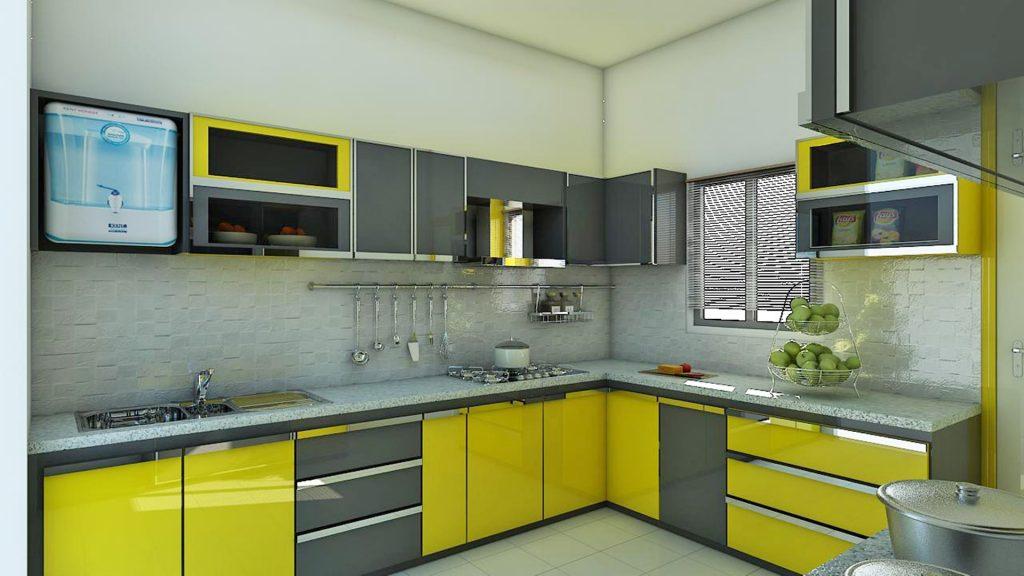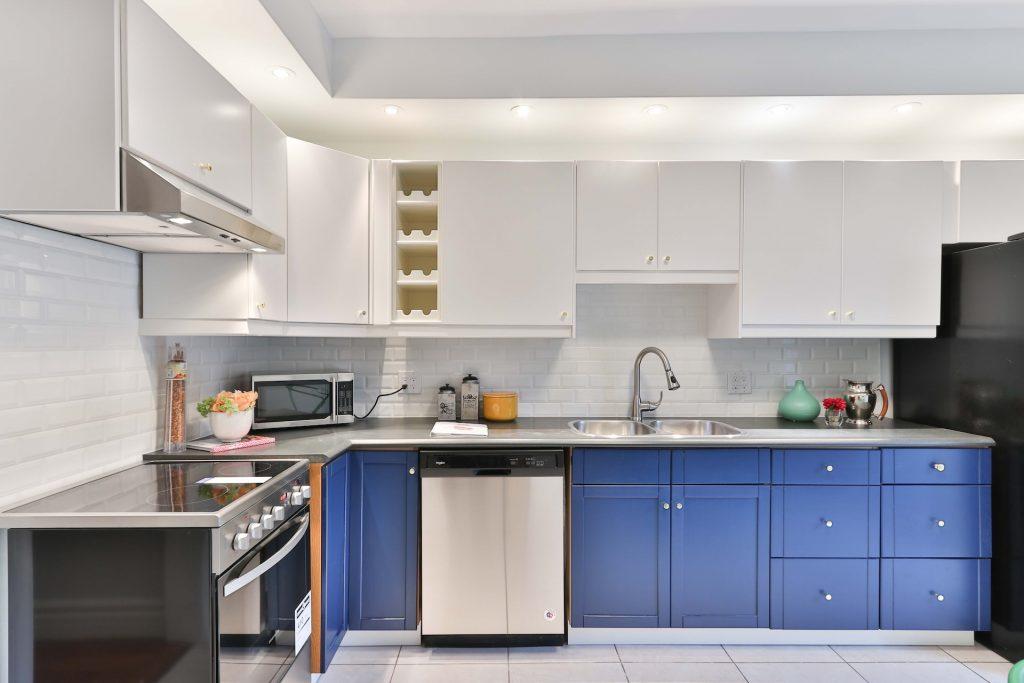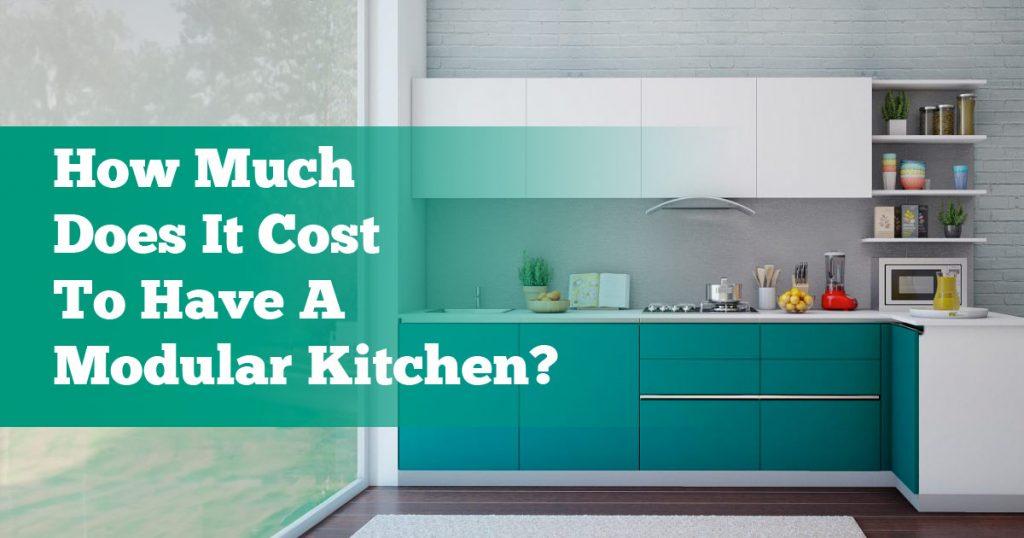The allure of a modular kitchen is undeniable—sleek designs, optimal organization, and functionality that transforms cooking spaces into efficient hubs. The question that often looms is whether the transition from a conventional kitchen to a modular one comes at a high cost. In this exploration, we delve into the intricacies of modular kitchen costs, examining the factors that influence them, and pondering if the investment is truly worth it.
Benefits of a modular kitchen
Before delving into the cost considerations, it’s essential to highlight the myriad benefits that come with a modular kitchen.
Aesthetic appeal
Modular kitchens are synonymous with sleek and stylish designs that transcend the conventional. The infusion of modern aesthetics elevates the overall look of a home, adding a touch of sophistication and contemporary charm. The clean lines, minimalist approach, and varied color schemes make modular kitchens a visual delight.
Optimal organization
One of the standout features of modular kitchens is their meticulous design, aimed at maximizing storage and optimizing space utilization. Every inch is thoughtfully considered, resulting in a well-organized kitchen where kitchen items have designated spaces. This not only enhances efficiency but also reduces clutter, contributing to a more enjoyable cooking experience.
Tailored solutions
Modular kitchens are not one-size-fits-all; they offer tailored solutions to cater to the unique needs of homeowners. The adaptability of design permits personalization according to individual tastes, lifestyles, and culinary practices. From the layout to the choice of materials, homeowners have the freedom to create a kitchen that aligns perfectly with their requirements.
Efficient and enjoyable cooking experience
The culmination of aesthetic appeal, optimal organization, and tailored solutions translates into an efficient and enjoyable cooking experience. All essentials are conveniently accessible, and the ergonomic layout guarantees a seamless workflow. Cooking transforms into an enjoyable experience in a thoughtfully designed modular kitchen.
Is it expensive to get a modular kitchen?
The shift from a traditional kitchen to a modular one raises concerns about the associated costs. However, the cost dynamics are multifaceted, and a nuanced understanding is crucial.

Initial Investment vs. Long-Term Benefits
While the initial investment in a modular kitchen might appear substantial, it’s essential to view it as a long-term investment. The enhanced functionality, efficient organization, and aesthetic appeal contribute to the overall value of the home. Over time, the benefits often outweigh the upfront costs, making it a prudent investment in the overall quality of life.
What are the factors that affect the cost?
1. Modular kitchen size
The size of the kitchen is a pivotal factor influencing the cost. Larger kitchens necessitate more modules, resulting in higher expenses. Additionally, different layouts, such as L-shaped, parallel, or U-shaped configurations, also impact the overall cost.
2. Materials/Finishes
The selection of materials is a key factor in influencing the overall expense of a modular kitchen. Common materials include MDF (medium-density fiberboard), HDF (high-density fiberboard), and plywood. The selection of finishes, from cost-effective laminates to luxurious veneers, adds diversity to the budget spectrum.
3. Kitchen aesthetics
Aesthetic considerations contribute to the cost equation. The selection of accessories, such as pull-out baskets, bottle pull-outs, tall units, and corner units, can enhance functionality but may incur additional expenses. Opting for high-end finishes and intricate designs also impacts the overall cost.
4. Built-in appliances
Choosing built-in appliances is a convenience that comes with a cost. While these appliances contribute to a seamless and integrated kitchen design, they add to the overall expense. However, they eliminate the need for separate purchases, streamlining the overall appearance and functionality of the kitchen.
5. Countertop material
The choice of countertop material is a crucial decision that influences both price and aesthetic value. Options like granite, quartz, or solid surface materials come with their own set of characteristics and costs. While granite is a popular and cost-effective choice, premium materials may incur higher expenses.
What do you need to turn your kitchen into a modular one?
To embark on the journey of transforming a conventional kitchen into a modular masterpiece, several key elements are essential:

1. Cabinetry
Cabinetry forms the core of any modular kitchen. Available in various materials such as MDF, HDF, plywood, and finishes ranging from laminates to veneers, the choice depends on budget constraints and aesthetic preferences. The cabinets are the foundation of a well-designed modular kitchen, providing storage and defining the overall look.
2. Countertops
The selection of countertops is a crucial aspect, impacting both functionality and aesthetics. Granite, quartz, and solid surface options cater to different needs and budgets. The countertop material not only contributes to the overall visual appeal but also determines the durability and maintenance requirements of the kitchen.
3. Accessories
Enhancing the functionality of a modular kitchen involves a thoughtful selection of accessories. Pull-out baskets, tall units, corner units, and other accessories contribute to an organized and efficient kitchen space. The right selection depends on individual requirements, cooking habits, and aesthetic preferences.
4. Appliances
Built-in appliances are a hallmark of a modern modular kitchen. Although they add to the total expense, they offer a cohesive and unified look. Choosing appliances that align with the overall design and functionality goals ensures a cohesive and efficient kitchen space.
Is it worth it to get a modular kitchen?
The decision to invest in a modular kitchen ultimately boils down to individual priorities, preferences, and budget considerations.
- Individual Priorities and Preferences: The decision to invest in a modular kitchen is deeply personal and depends on individual priorities, preferences, and budget considerations. Although the initial investment may appear significant, the lasting advantages frequently validate the expenditure. A modular kitchen goes beyond being a functional space; it becomes a lifestyle choice that enhances the overall quality of living.
- Enhanced Functionality: The enhanced functionality of a modular kitchen is a key factor in its worth. The well-thought-out design, efficient organization, and seamless workflow contribute to a kitchen experience that is both enjoyable and stress-free. The investment in a modular kitchen translates into an investment in daily convenience and efficiency.
- Optimal Organization and Aesthetic Appeal: A modular kitchen’s efficient organization guarantees that each item has its assigned space, minimizing mess and improving efficiency. Additionally, the stylish designs and contemporary finishes contribute a touch of opulence to the home. The amalgamation of these factors makes a modular kitchen a valuable addition to any home.
A modular kitchen is nice to have
To sum up, although the expense of transforming a standard kitchen into a modular one is a crucial factor, the advantages and enduring value frequently surpass the initial investment. The tailored organization, sleek designs, and efficient use of space make a modular kitchen a valuable addition to any home. It’s not just an expense; it’s an investment in the comfort, functionality, and aesthetics of one’s living space. So, for those contemplating the shift to a modular kitchen, the consensus is clear—a modular kitchen is not just a luxury; it’s a necessity for the modern homeowner.
